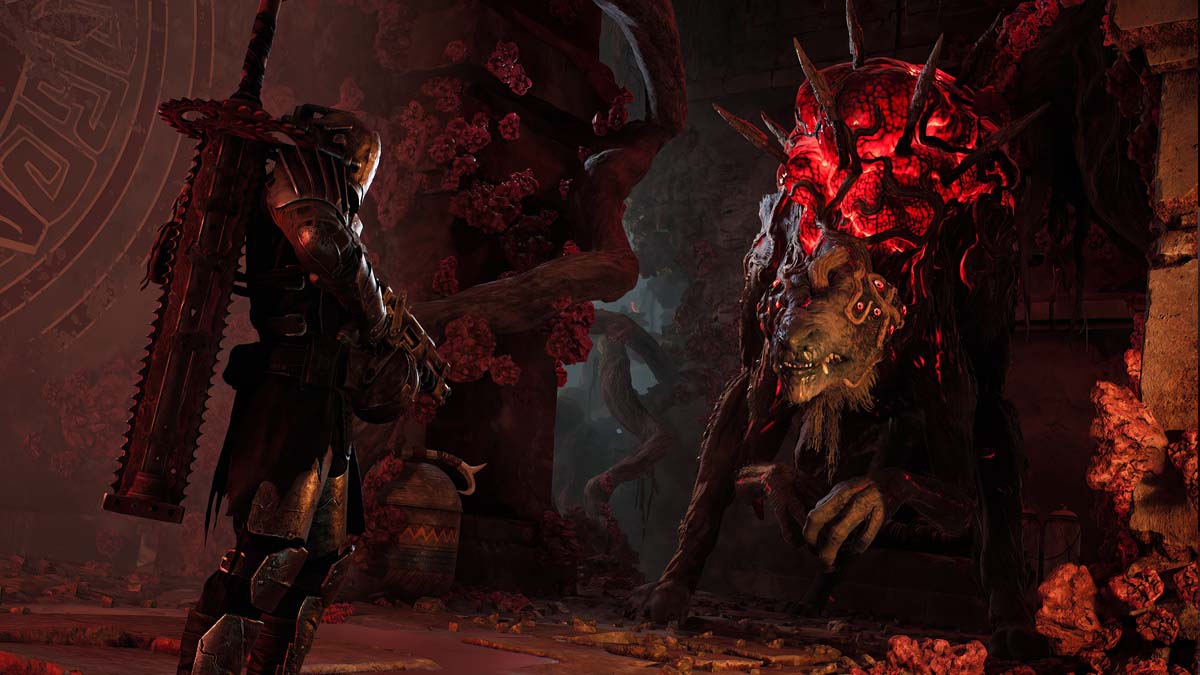There’s an unreasonably large amount of secrets to uncover in Remnant 2. And the Archon unlock requirements are the most nebulous and mindbending. In the days leading up to its release, the game’s Principle Designer, Ben Cureton, mentioned how even some developers and those with more than 400 hours in the game hadn’t seen everything it had to offer. As unbelievable as that claim might seem, when Remnant 2 released, it seemed possible. I and the millions who have played quickly found out Cureton wasn’t exaggerating.
And now, just a week after the official release, Remnant 2‘s greatest secret so far has been revealed. The Archon Archetype is so well hidden that it wasn’t even found using the information in the game itself. Instead, unlocking the Archetype class was meta-commentary on a game mechanic level. It was designed to be found by data mining and community action — not by playing the game.
Archon: The Class That Must Be Data Mined
Unlocking the Archon Archetype in Remnant 2 requires incredibly obscure and circuitous thinking. When the requirements were finally discovered, Cureton said that rather than trying to stop the data mining he and the team knew would happen, they “leaned into it.”
And it seems like that’s exactly what happened. Data miners, gamers with a head for programming and a desire to plumb the deepest secrets of their favorite games, dove deep into Remnant 2. They found clues that collectively led to finding what it took to unlock Archon. Short of going through the whole process, players need to collect items like:
- Leto’s Amulet, which you can only buy from Reggie in Ward 13. And that’s only after you’ve flopped on the ground 100 times while over-encumbered.
- Wear both the Explorer Level 10 Fortune Hunter Skill and the secret Invader Archetypes’s Wormhole Skill.
- Sacrifice the world of N’Erud to a black hole (not always an available choice), and get the Void Relic from its ruins.
You then need to equip these and 10 other vastly different (and sub-optimal when used together) items. Then you need to go to a hidden door in the Labyrinth. Still, you’ll need to search for an in-game representation of The Backrooms — a nearly 10-year-old online urban legend/creepypasta — for a Strange Cube. Then you’ll give it to Wallace at Ward 13 for the Archon Engram.
So yeah, it’s technically not an impossible task to figure out without digging into Remnant 2‘s code base. However, it’s also a wildly improbable one. But data mining exists, and it’s a huge part of any online game’s community, whether we like it or not. And depending on who you talk to, that’s either a fine thing or a very not fine thing.
Related: Our Remnant 2 Review
Should More Games Embrace Data Mining Like Remnant 2?

Secrets hidden deep within games used to be the stuff of legends. They were spread among school halls and friend groups like wildfire, many of them unverifiable. With the internet connecting billions of gamers, secrets are now just bait for those with the skill and desire to hunt for them. Not in the game but in the code that makes the game function.
Games like Destiny 2 have been hamstrung between keeping secrets from their community and understanding that they can only keep those secrets actually secret for a few days. That’s despite the reveals not supposed to happen for weeks or months. The Remnant 2 team similarly knew it wouldn’t be long before players uncovered every secret. Archon was their answer. It gave data miners a secret designed specifically for them that feeds into the game world.
I’m not sure how I feel about it all. I understand that Remnant 2‘s narrative leans into meta-commentary. Trying to bridge the gap between the real and the digital has created some of gaming’s best moments (think Undertale as probably the best example). And I know data mining itself is innocuous enough as long as the information isn’t spread.
How It Could Affect the Community
Data mining inevitably leads to huge story beats being spoiled for massive parts of the community. Some want to see them when they’re meant to be seen. Social media and the internet make it almost impossible to miss spoilers these days — even if we’re not actively seeking out spoilers. Then there are developers who actively push against the practice, like Escape from Tarkov‘s devs Battlestate Games. Their disdain for data mining is such that they’ll actively ban anyone found doing it.
I worry that Remnant 2’s embracing of data miners will have a more negative effect on community engagement than a positive one. Suddenly, a practice on the relative fringe gets center stage. That means lots of press time (my hypocrisy on full display, I’m aware), and much of it could be more glowing than some people might like. “Look at this cool thing that one game did! That’s community engagement,” someone could say.
The issue is, if an act that can have a detrimental effect on the experience is now something worthy of praise, will others follow suit? Will it cause a snowball data mining frenzy far in excess of its current state as miners push harder to find secrets that don’t exist? It happens already in the Destiny community. Bungie has had to clarify, in no uncertain terms, that no: just because they talked about secrets doesn’t mean there are any to find.
Setting a New Precedent — Maybe

In my mind, such an environment creates a no-win situation for developers. On the one hand, the thrill of discovery in games is one of the medium’s greatest strengths. On the other, creating a secret that’s more annoying for the average player than fun is a significant risk. And thirdly, there’s the threat that less scrupulous gamers could see the rise in data mining’s popularity and use it as a smokescreen for something much less savory.
My last concern is that things like these could become a trend. Others will perhaps try to capitalize on a moment to their game’s detriment. They may not understand how Remnant 2‘s use of community curiosity is ultimately integral to the experience it creates. The hundreds of Souls-likes out there that aspire for greatness but ultimately fall short are a testament to my worry. But maybe this one instance won’t create the ripples we’ve all seen.
I think there’s also a distinction between a community coming together to fish for data and a situation where a community spends hours unraveling a puzzle or testing new mechanics when an update comes out. Sure, finding the fragments of a character, level, or boss that never came together is a great way to learn about the developer’s intentions or process. But previously, data mining of the kind Remnant 2 is leaning into wasn’t something most people embraced. Now that it’s happened once, what will the next instance be like?
Is This Really the Future?
And maybe I’m overthinking all this. Maybe Remnant 2 is in a unique situation. After all, if you actually want to get the Archon Archetype, just having the information on how isn’t enough. Sure, you can spoil yourself on YouTube if the massive amount of grinding necessary isn’t for you, but you won’t see an important story beat weeks before it was scheduled. And if you don’t play the game, niche as it is, all this doesn’t really matter at all.
So, should more games embrace data mining? I think it’s very case-by-case, but ultimately I don’t think so. A game should be built to be only what it was meant to be and not have mechanics or systems shoehorned in because some other title did it really well. What Remnant 2 has done with Archon was undoubtedly a risk, but it has created a cool gaming industry moment. Hopefully, that’s where it stays.







Published: Jul 30, 2023 02:29 pm